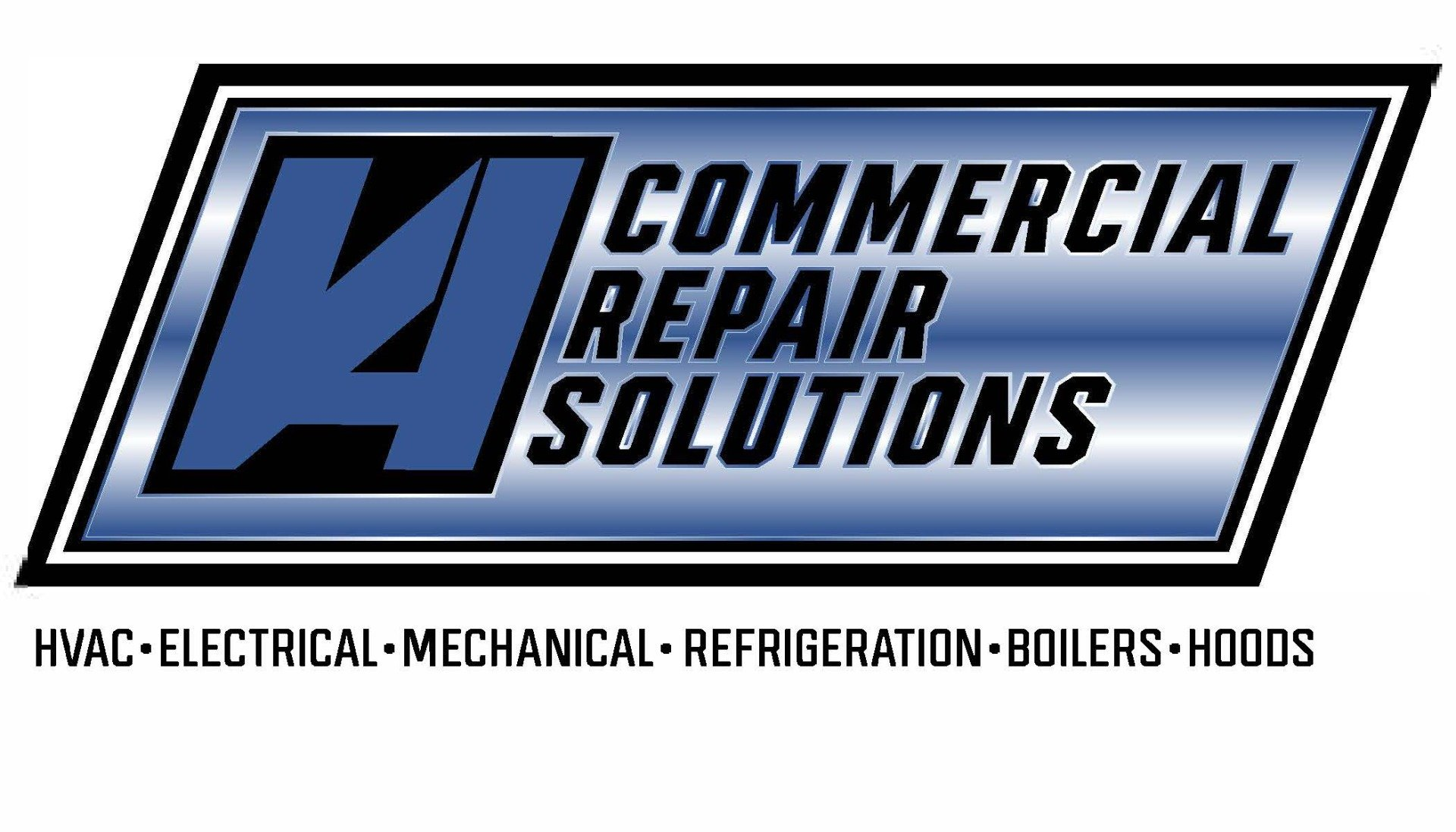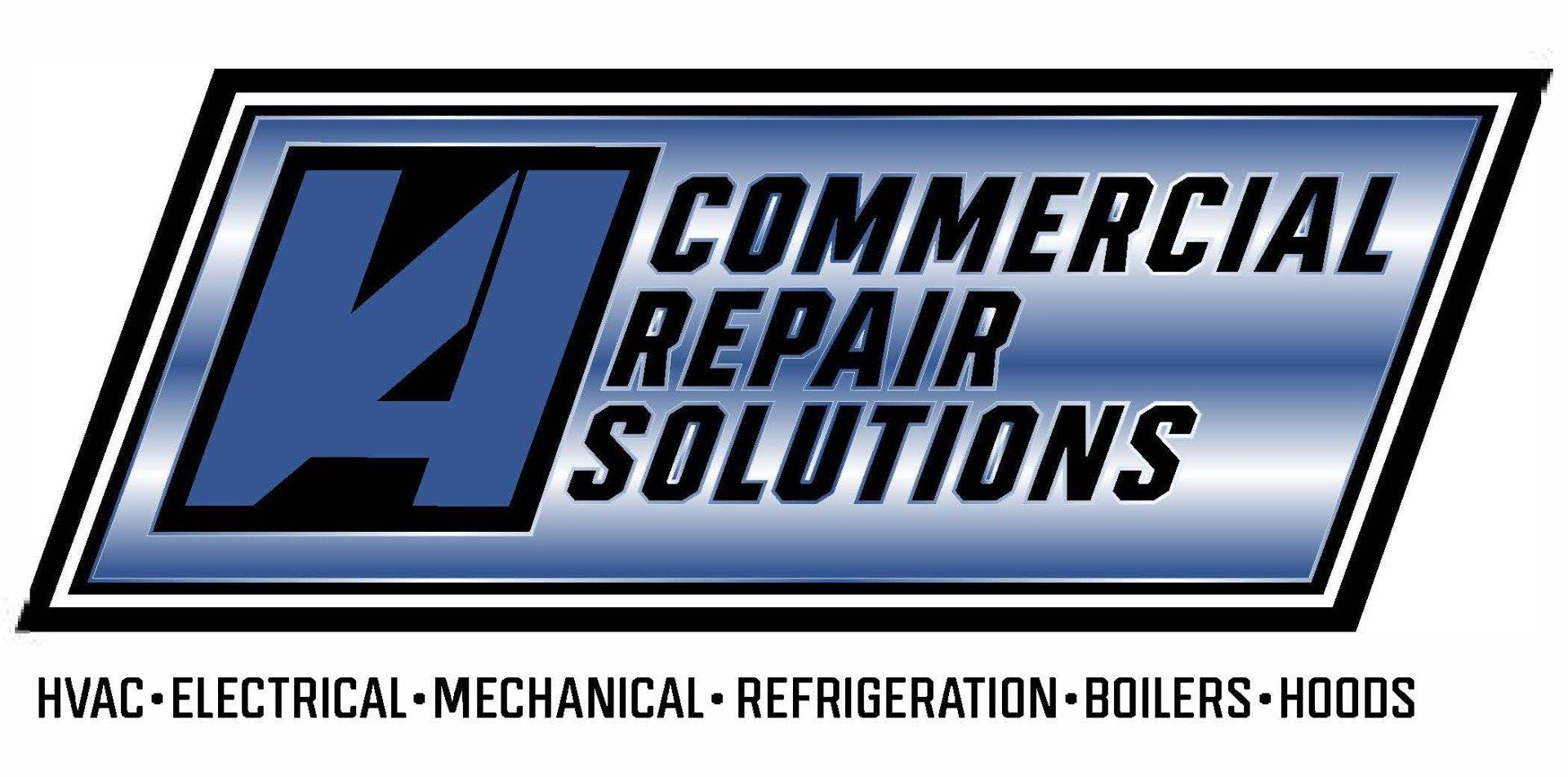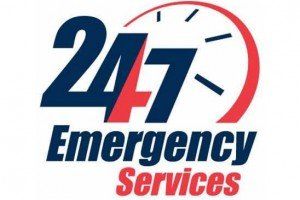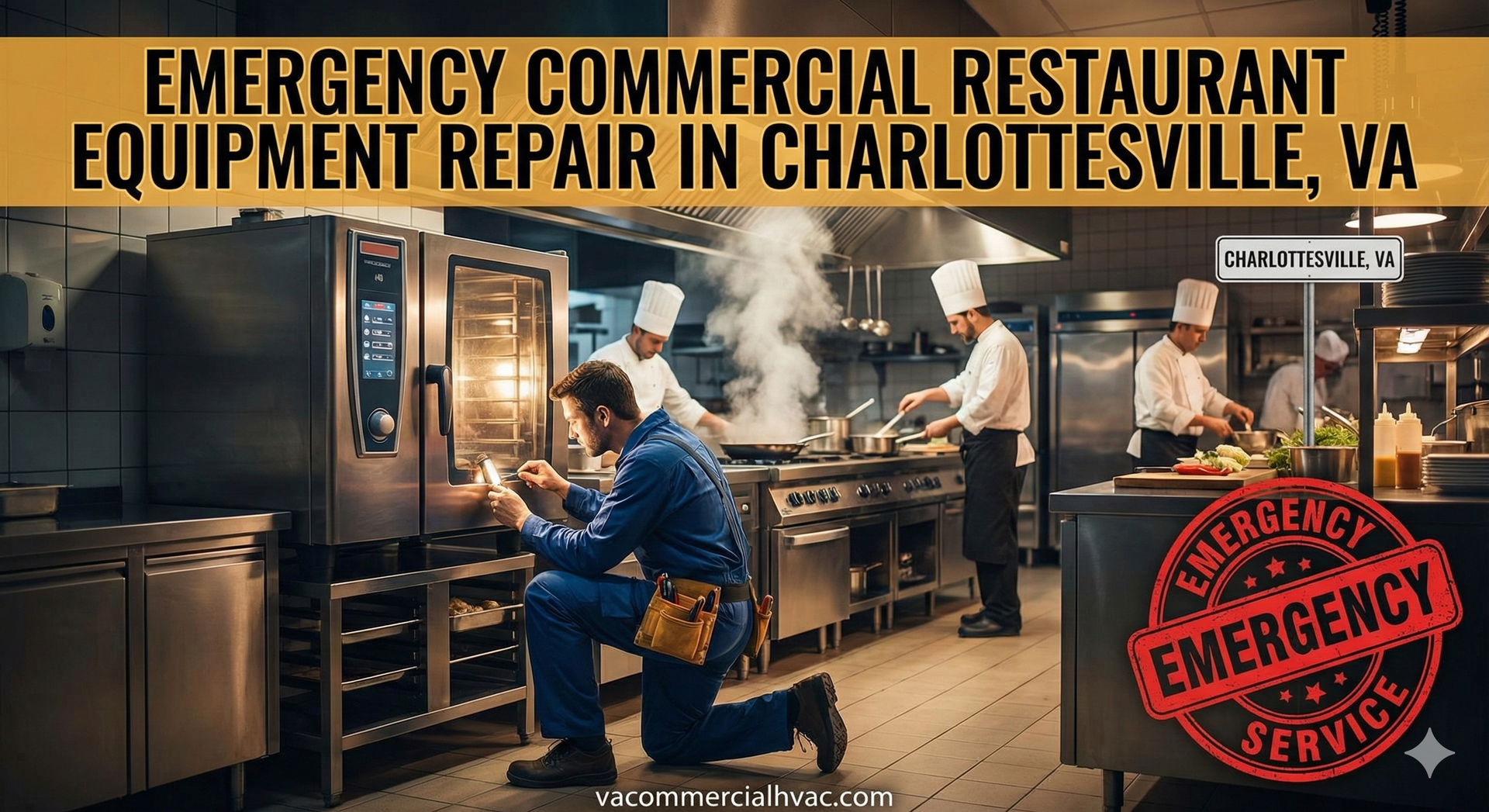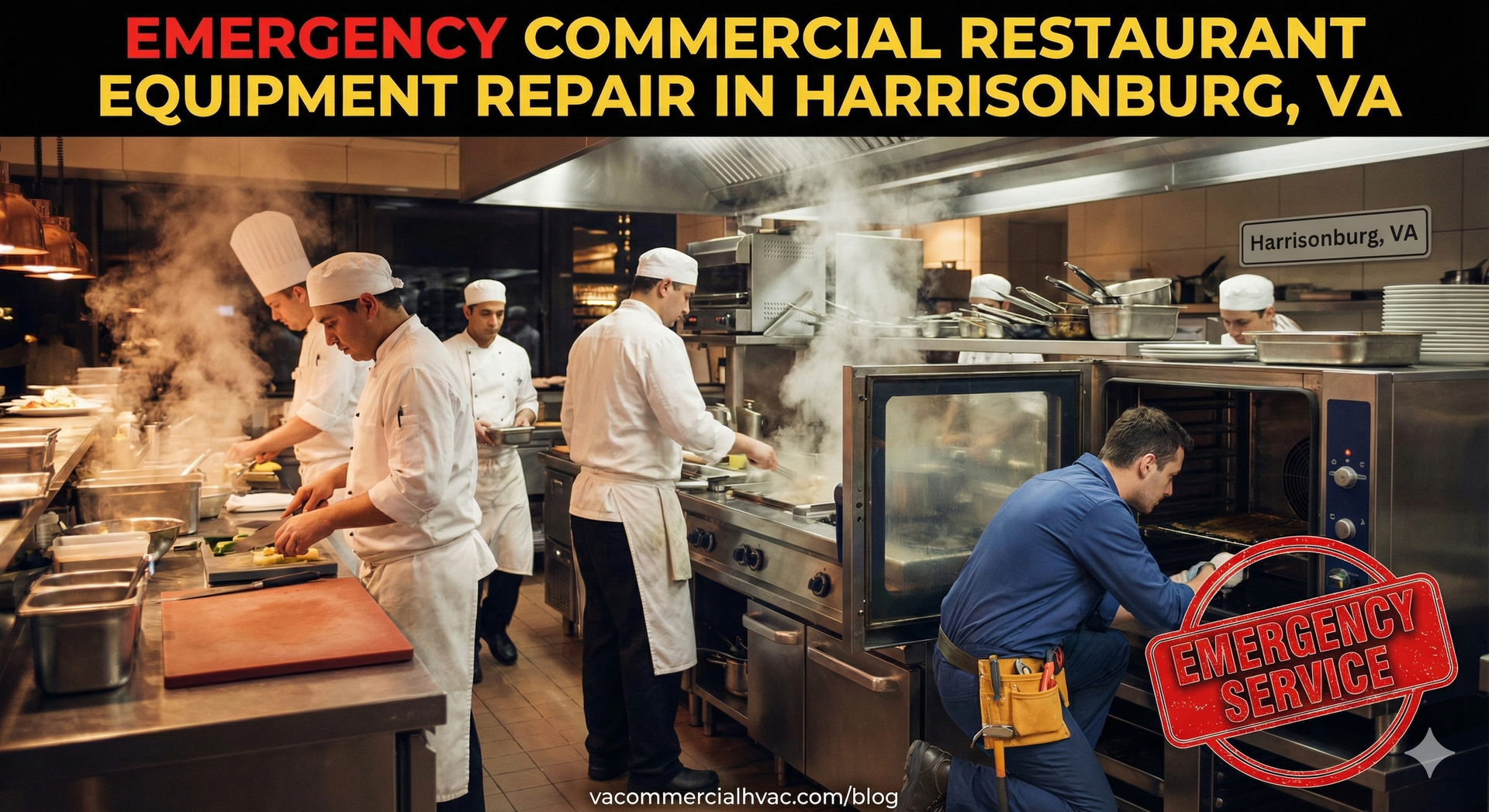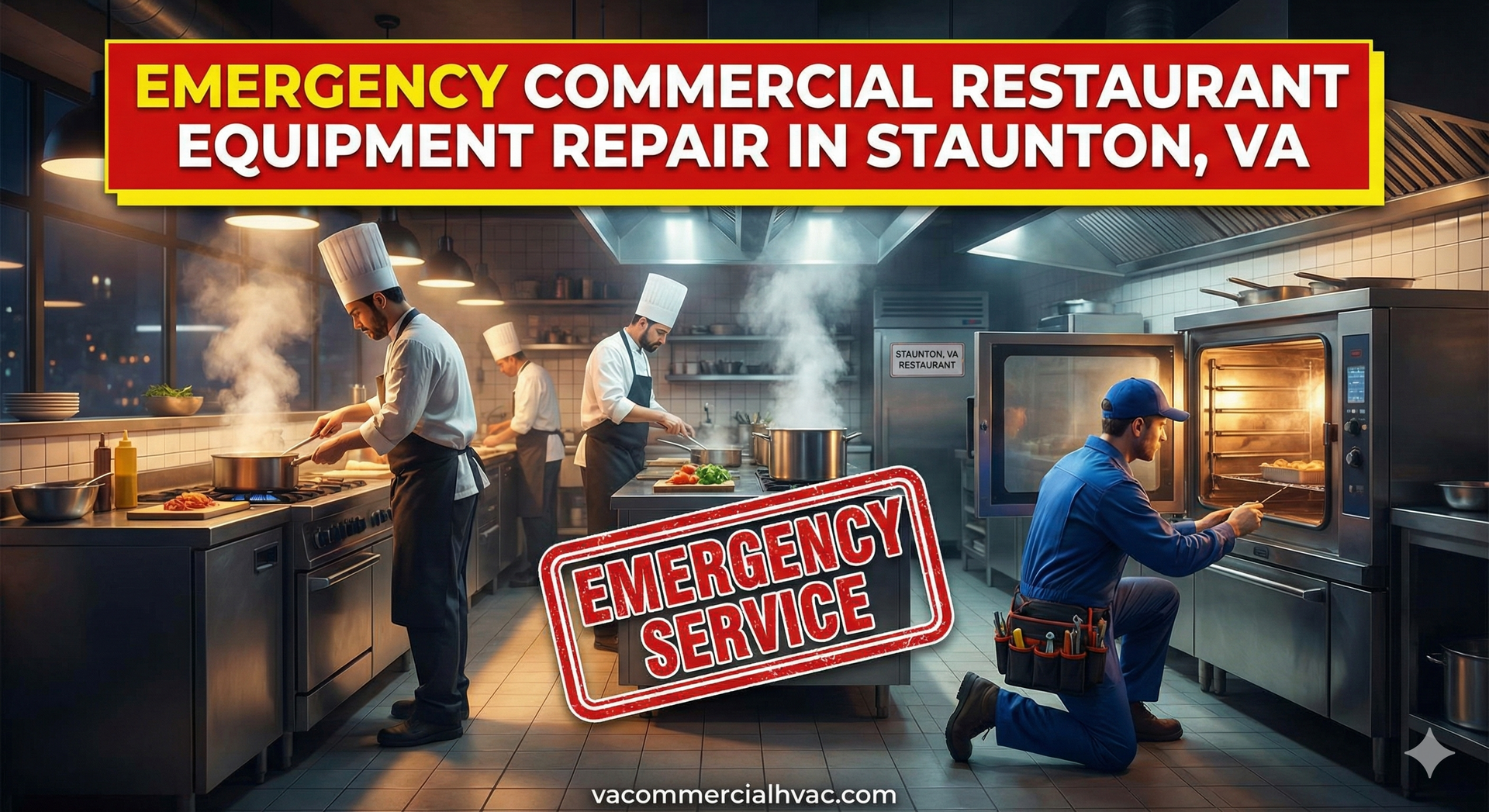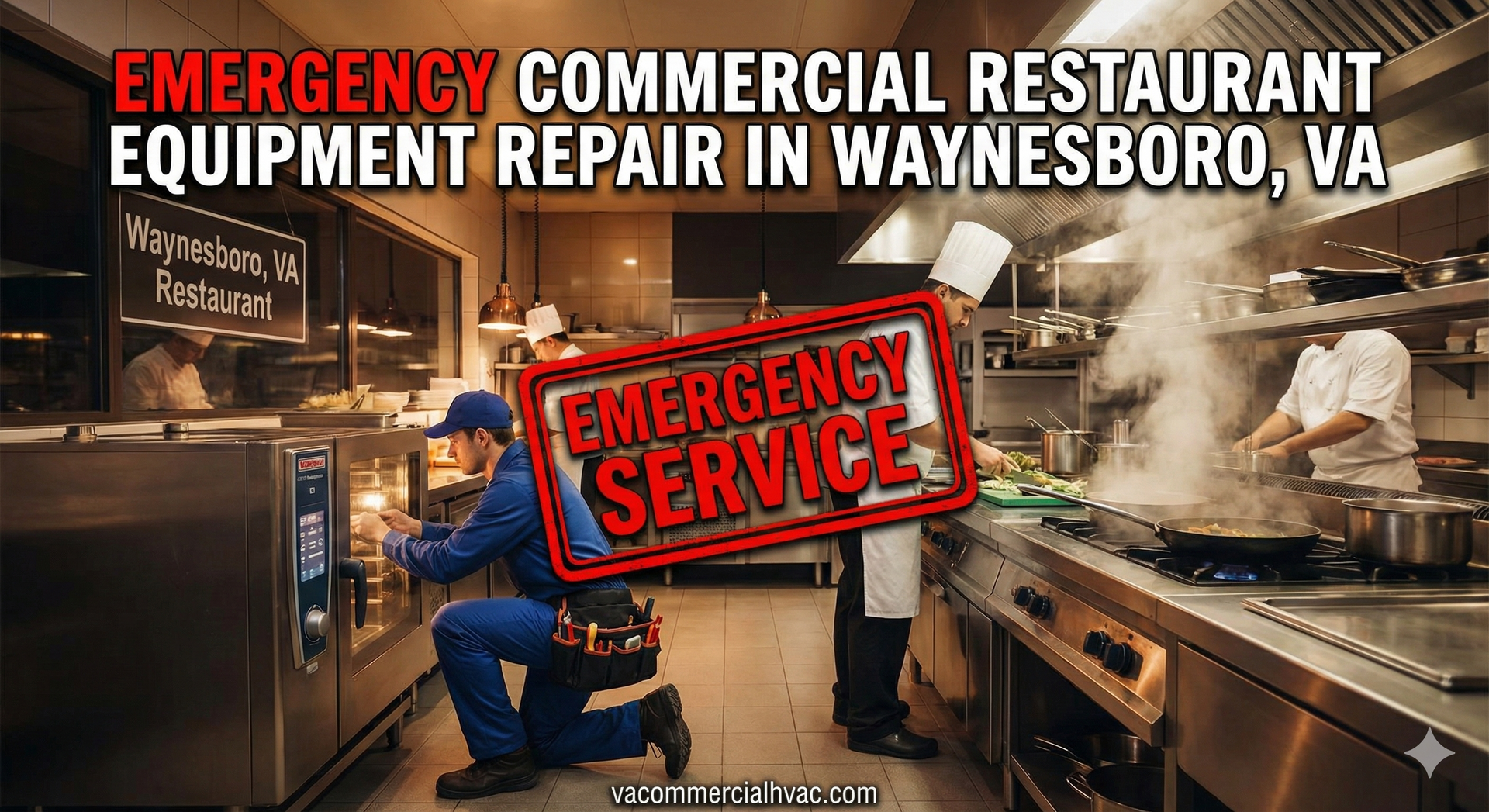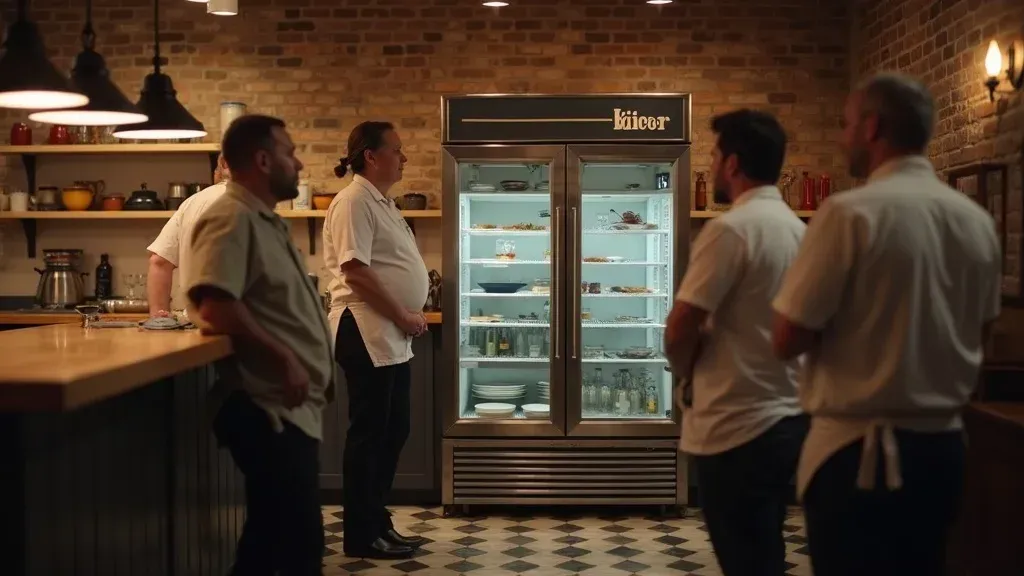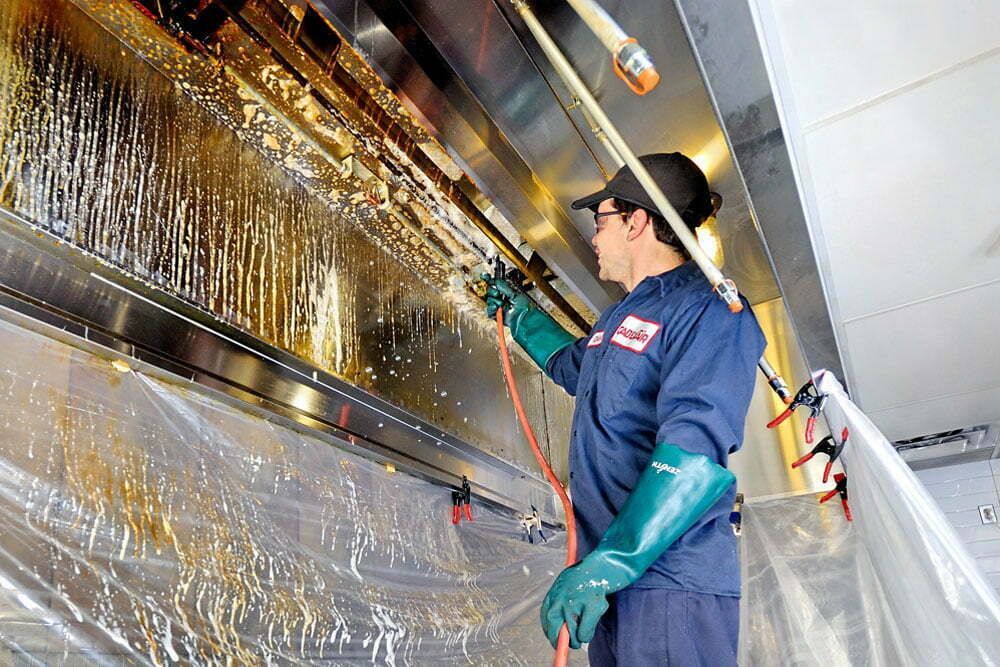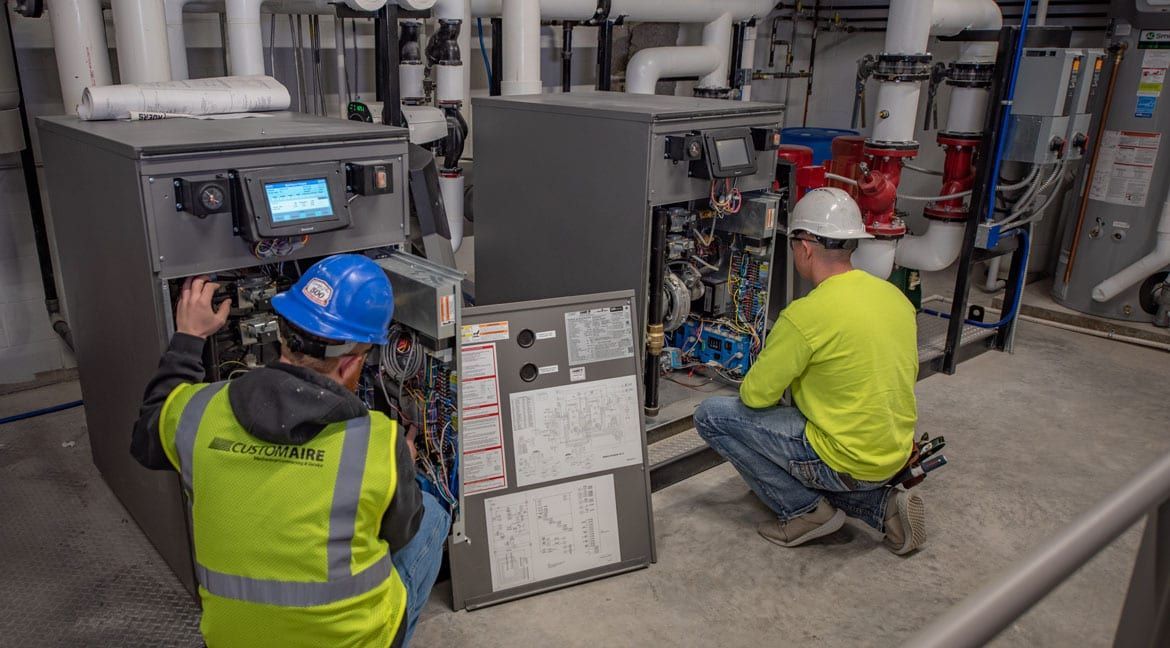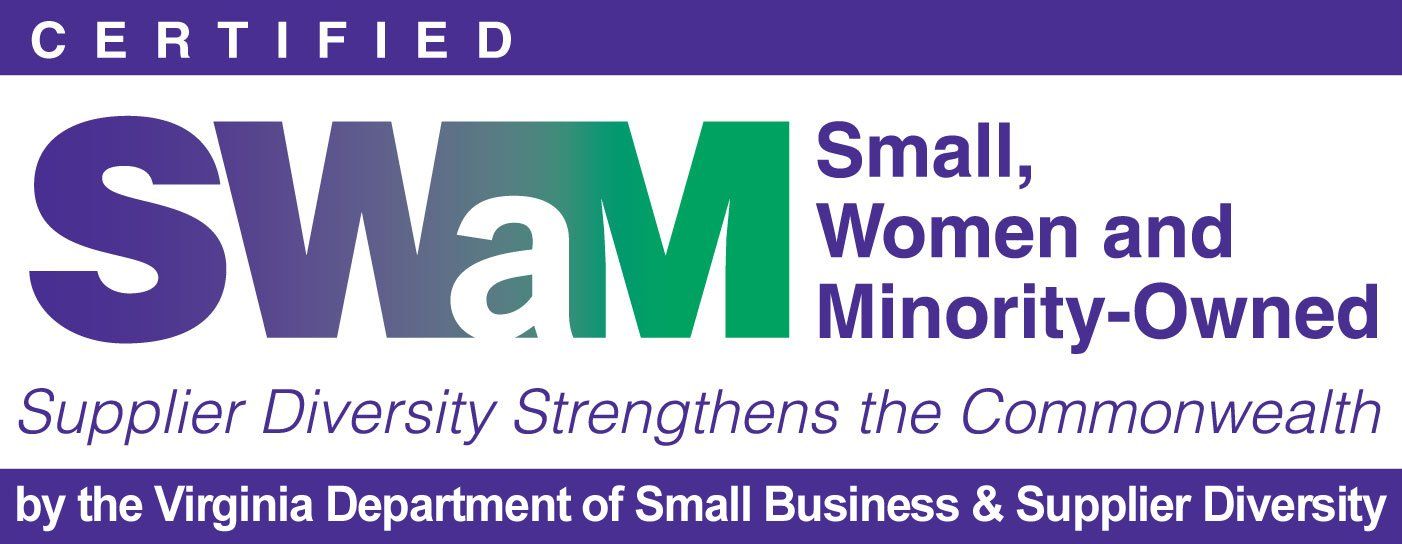Commercial Ice Maker Maintenance Harrisonburg VA: The Ultimate Guide to Clean, Reliable Ice
Expert daily, weekly, and monthly ice machine maintenance protocols for Harrisonburg restaurants, JMU dining facilities, and commercial kitchens to ensure FDA compliance and peak performance.
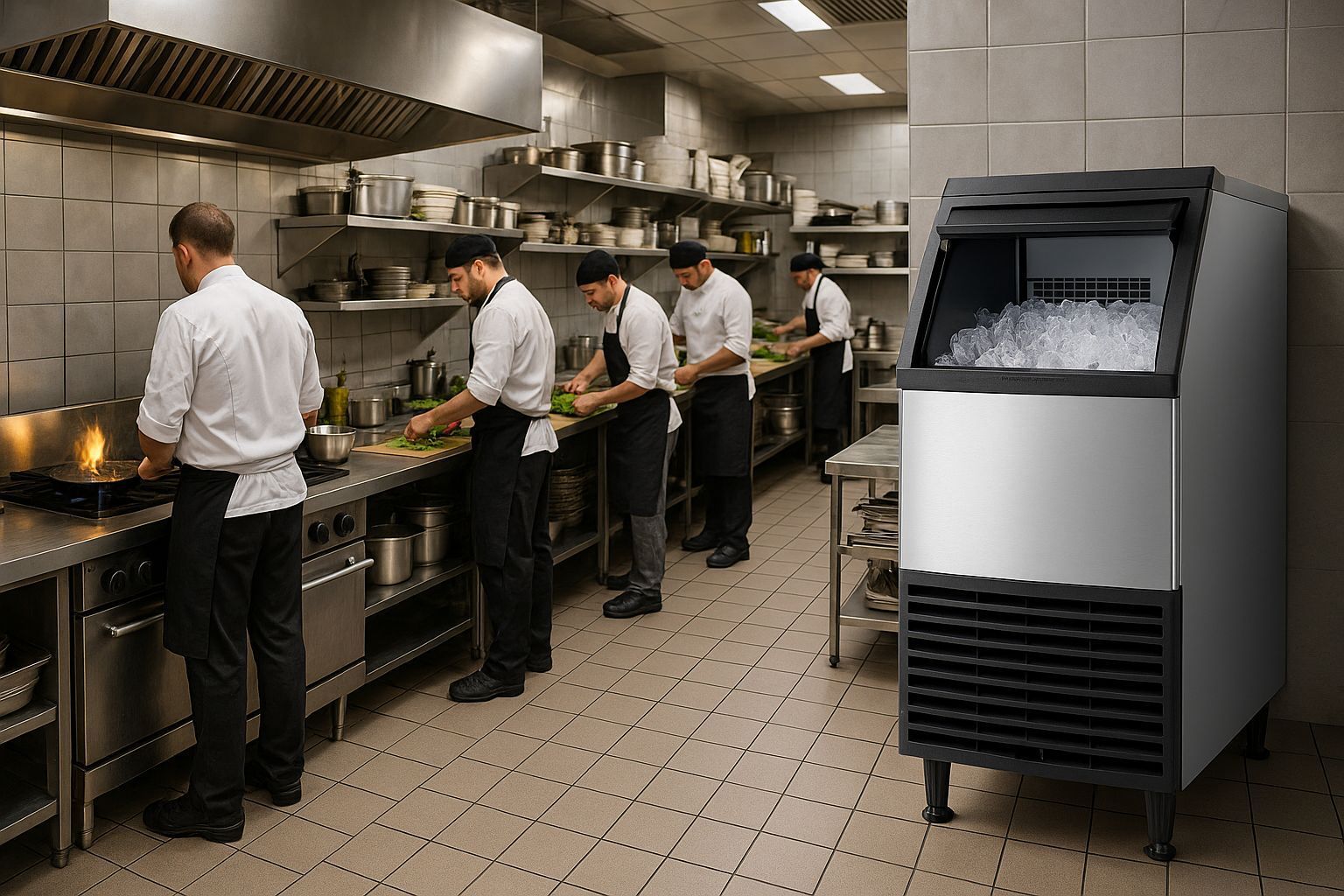
Essential Maintenance Facts-at-a-Glance
- Regular maintenance of commercial ice makers reduces emergency repairs by up to 70% while significantly extending equipment lifespan.
- Harrisonburg's municipal water quality requires special attention to filtration systems to prevent mineral buildup and ensure clean ice production.
- Both FDA federal regulations and Virginia Health Department standards classify ice as food, requiring strict sanitation protocols.
- A combination of daily staff attention and professional service provides optimal equipment reliability and regulatory compliance.
- Professional ice machine maintenance delivers measurable financial benefits through reduced emergency expenses and improved operational efficiency.
Ice quality directly impacts customer experience, regulatory compliance, and your bottom line. For Harrisonburg businesses depending on reliable ice production, proper maintenance isn't just about preventing breakdowns—it's about protecting your reputation and investment. VA Commercial Repair Solutions provides specialized ice maker maintenance services that ensure your equipment runs efficiently while meeting all health department requirements.
Commercial ice makers face unique challenges in the Shenandoah Valley business environment. From JMU campus dining facilities to downtown restaurants serving tourists, proper maintenance protocols must address local water conditions, seasonal demands, and specific regulatory requirements. Establishing a comprehensive maintenance schedule prevents those emergency service calls that always seem to happen during your busiest periods.
Why Clean Ice is Critical for Harrisonburg Businesses
Clean, clear ice isn't just visually appealing—it's a direct reflection of your establishment's commitment to quality and safety. In Harrisonburg's competitive hospitality market, customers notice cloudy, foul-tasting ice immediately and associate it with poor sanitation practices throughout your facility. Beyond perception, contaminated ice presents genuine health risks that can lead to foodborne illness outbreaks, health code violations, and potentially devastating reputational damage.
The FDA classifies ice as food, meaning it must be produced under the same sanitary conditions as any other consumable product. Virginia's Health Department enforces additional requirements specific to ice production and handling in commercial establishments. These regulations mandate regular cleaning, proper storage procedures, and documentation of maintenance activities—all crucial aspects of a comprehensive ice machine maintenance program.
Service consistency through reliable ice production maintains customer expectations and drives long-term revenue growth. When equipment failures disrupt service during peak business hours, the impact extends beyond immediate repair costs to lost sales and diminished customer confidence. Professional maintenance prevents these disruptions while ensuring the highest standards of ice quality and safety.
5 Warning Signs Your Commercial Ice Maker Needs Immediate Attention
Recognizing early warning signs can help you address potential issues before they escalate into major problems. Proactive response to these indicators not only prevents costly emergencies but also maintains continuous ice production for your Harrisonburg operation.
1. Strange Noises During Operation
Unusual grinding, knocking, or rattling sounds from your ice maker signal mechanical problems that require immediate attention. These noises often indicate issues with the compressor, fan motor, or water pump—critical components that can lead to complete system failure if not addressed promptly. Normal ice maker operation should be relatively quiet, with only the expected hum of the compressor and occasional water movement sounds.
2. Cloudy or Discolored Ice
Crystal clear ice is the standard for quality commercial production. When your machine starts producing cloudy, white, or discolored ice, it typically indicates mineral buildup, mold growth, or contamination within the system. Harrisonburg's municipal water contains minerals that can accumulate over time, particularly without proper filtration. Yellow or brown tints often signal rust in water lines, while black specks may indicate mold—both requiring immediate professional cleaning.
3. Slow Ice Production
Ice Production Decline Warning Signs
• Normal production reduced by 20% or more
• Longer recovery times between harvest cycles
• Inability to meet peak demand periods
• Inconsistent cube size or incomplete formation
• Extended freeze cycles with minimal yield
When ice production slows, it typically indicates scale buildup on evaporator plates, refrigeration issues, or water supply problems. Harrisonburg's water contains minerals that gradually accumulate on internal components, reducing heat transfer efficiency and extending freeze cycles. A machine that once produced 500 pounds daily might drop to 350 pounds or less when maintenance is neglected—an unacceptable reduction during summer peak demand periods.
Refrigerant leaks, compressor problems, or condenser issues can also cause production slowdowns. These require professional diagnosis as they involve specialized equipment and technical expertise to resolve properly. Systematic maintenance prevents these efficiency losses while ensuring your machine meets capacity demands even during the busiest service periods.
4. Water Leaks Around Machine
Water pooling around your ice maker indicates potential problems with water inlet valves, drain systems, or internal component failures. Beyond creating slip hazards for staff, these leaks can damage surrounding equipment, flooring, and even structural elements in your Harrisonburg facility. Small leaks often precede major failures, making early detection critical for preventing extensive damage.
Check connections, drain lines, and overflow protection systems daily for signs of moisture or active leaking. Clogged drain lines are particularly common in food service environments where food particles can gradually restrict proper drainage. Professional maintenance includes thorough inspection and cleaning of these systems to prevent blockages and ensure proper water flow throughout the ice making cycle.
Ice machines in high-humidity environments like restaurant kitchens can also experience condensation issues that mimic leaks. Proper ventilation and consistent ambient temperature help minimize condensation while improving overall equipment efficiency. VA Commercial Repair Solutions technicians evaluate environmental factors during maintenance visits to identify and address these operational challenges.
5. Foul Odor or Taste in Ice
Unpleasant odors or tastes in ice often indicate bacterial growth, mold contamination, or chemical residue within the system. These contaminants not only affect customer experience but can potentially cause illness—a serious liability concern for any Harrisonburg business. Food particles, beverage splatter, and airborne contaminants gradually accumulate in ice machines, creating ideal conditions for microbial growth if not regularly addressed.
Daily Maintenance Tasks That Prevent Costly Breakdowns
Consistent daily attention forms the foundation of effective ice maker maintenance. Staff can perform these simple tasks in minutes, dramatically reducing contamination risks while extending equipment life. Establishing clear responsibilities and documentation procedures ensures nothing gets overlooked in busy operational environments.
Exterior Cleaning Requirements
Wipe down all exterior surfaces daily using food-safe sanitizer and clean microfiber cloths to prevent dust, grease, and contaminant accumulation. Pay special attention to door handles, hinges, and the area surrounding the ice retrieval opening where hand contact frequently occurs. In Harrisonburg's restaurant environments, airborne grease can create a sticky film that collects contaminants and eventually transfers to ice during retrieval.
Never use abrasive cleaners, ammonia products, or bleach on stainless steel surfaces as these can damage protective finishes and potentially contaminate ice production. Instead, use manufacturer-recommended or food-service approved cleaners designed specifically for ice machine applications. Always follow with a clean water rinse and proper drying to prevent chemical residue that could affect ice quality.
Establish a cleaning log to document daily maintenance, ensuring accountability and providing essential records for health inspections. Virginia health regulations require documentation of regular cleaning activities, and comprehensive records demonstrate your commitment to food safety standards. These logs also help identify patterns of contamination that might indicate larger maintenance issues requiring professional attention.
Ice Scoop Sanitation Procedures
- Store ice scoops outside the ice bin in a dedicated holder to prevent contamination
- Wash and sanitize scoops at least daily using proper dishwashing procedures
- Replace cracked or damaged scoops immediately to prevent bacterial harborage
- Train staff on proper handling techniques to avoid hand contact with ice
- Use only food-grade plastic or stainless steel scoops approved for ice handling
Improper ice scoop handling represents one of the most common contamination vectors in Harrisonburg food service operations. Virginia Health Department inspectors frequently cite violations related to scoop storage and sanitation. Implementing proper protocols not only ensures compliance but protects customers from potential foodborne illness associated with contaminated ice.
Visual Inspection Checklist
Conduct daily visual inspections of critical components including water filters, drain lines, ice quality, and production rate. Early detection of potential issues allows for prompt intervention before minor problems escalate into major failures. Train staff to recognize normal operating conditions so they can quickly identify deviations that warrant further investigation or professional service.
Check ice quality by examining sample cubes for clarity, proper formation, and absence of foreign material. Cloudy ice often indicates mineral buildup or filtration issues, while misshapen cubes may signal problems with the freezing cycle or evaporator plates. Document any abnormalities and contact professional service if issues persist despite basic cleaning procedures.
Weekly Deep Cleaning Protocol for Commercial Ice Makers
Weekly deep cleaning reaches areas that daily maintenance cannot access, removing biofilm buildup and mineral deposits that affect ice quality and equipment efficiency. In Harrisonburg's food service environment, this regular attention prevents contamination while maintaining optimal production capacity. Manufacturers recommend specific cleaning intervals based on usage patterns and environmental conditions, but weekly attention provides baseline protection for most operations.
Schedule deep cleaning during low-demand periods to minimize operational impact. Early morning hours before service begins often provide ideal opportunities for thorough maintenance without disrupting business operations. Always ensure sufficient time for the machine to complete several production cycles after cleaning before returning to service.
Proper cleaning supplies and tools should be dedicated exclusively to ice machine maintenance to prevent cross-contamination from other kitchen areas. Designate a specific storage location for these items and establish a restocking procedure to ensure necessary supplies remain available when needed.
1. Prepare the Machine for Cleaning
Begin by turning off the ice maker and removing all existing ice from the storage bin. Never return old ice to the machine after cleaning as it may reintroduce contaminants to the freshly sanitized system. Allow the unit to warm slightly before cleaning to improve the effectiveness of cleaning agents on mineral deposits and biofilm.
Disconnect water supply lines when possible and drain any standing water from the system according to manufacturer instructions. This prevents dilution of cleaning solutions while allowing better access to internal components. Some models feature specific cleaning modes or preparation procedures—always consult your equipment manual for model-specific requirements.
2. Disassemble Removable Parts
Remove all accessible components including ice curtains, deflectors, water distribution tubes, and baffle plates according to manufacturer instructions. These components harbor significant biofilm and mineral buildup that affects both ice quality and production efficiency. Label parts during disassembly if necessary to ensure proper reassembly after cleaning.
Inspect each component for damage, wear, or excessive buildup that might indicate larger maintenance issues. Cracked plastic components, worn gaskets, or heavily corroded metal parts should be replaced rather than reused. Professional maintenance services like VA Commercial Repair Solutons maintain inventory of common replacement parts for major ice machine brands serving Harrisonburg businesses.
3. Apply Manufacturer-Approved Cleaning Solutions
Use only manufacturer-recommended cleaning agents formulated specifically for commercial ice equipment. Generic cleaners may contain ingredients that damage seals, gaskets, or metal components while failing to properly address the unique cleaning requirements of ice machines. Never substitute household cleaners, vinegar solutions, or bleach products as these can damage components and leave harmful residues.
Mix cleaning solutions according to manufacturer specifications—never increasing concentration in attempts to improve cleaning effectiveness. Allow proper contact time with surfaces as specified in cleaning instructions, typically 5-15 minutes depending on product and buildup severity. For heavily scaled surfaces, additional applications may be necessary rather than extended contact time or increased concentration.
Clean removable parts separately using appropriate brushes and cleaning tools designed for food-contact surfaces. Pay special attention to water distribution tubes and spray nozzles where mineral deposits frequently accumulate and restrict water flow. Rinse thoroughly with clean water after cleaning to remove all chemical residue before sanitization.
4. Sanitize All Components
After cleaning, apply food-grade sanitizer to all surfaces following concentration guidelines precisely. Sanitization eliminates harmful microorganisms that cleaning alone cannot remove, providing crucial protection against contamination. Most manufacturers recommend specific sanitizing agents that work effectively with their equipment while meeting food safety regulations.
Allow proper contact time specified by the sanitizer manufacturer, typically 1-5 minutes depending on the product. Over-exposure to sanitizing agents can damage certain components, so follow timing guidelines carefully. Rinse thoroughly with clean, potable water if required by the sanitizer instructions—some quaternary ammonium compounds require rinsing while others are designed as no-rinse formulations when properly diluted.
5. Reassemble and Test Production
Carefully reassemble all components according to manufacturer diagrams, ensuring proper orientation and secure connections. Improper assembly can lead to water leaks, production inefficiency, or component damage during operation. Verify all gaskets and seals are properly seated to prevent air or water leaks that affect production quality.
Run at least two complete ice production cycles before returning the machine to service, discarding the first batch of ice produced after cleaning. This ensures any residual cleaning agents are completely flushed from the system while confirming proper operation. Inspect the first several batches for proper cube formation, clarity, and any unusual characteristics that might indicate incomplete cleaning or mechanical issues.
Document the cleaning procedure in your maintenance log, noting any issues encountered or components showing signs of wear. This documentation provides essential records for health inspections while tracking maintenance patterns that help predict replacement needs before failures occur.
Harrisonburg's Water Quality and Its Impact on Ice Makers
Water quality significantly affects ice machine performance and longevity in Harrisonburg's municipal water environment. Local water contains minerals, particularly calcium and magnesium, that accumulate on internal components over time. These deposits reduce heat transfer efficiency, restrict water flow, and create conditions favorable for bacterial growth if not properly managed through filtration and regular maintenance.
Mineral Content Analysis
Harrisonburg's municipal water contains varying levels of dissolved minerals depending on seasonal factors and treatment adjustments. Professional water testing provides accurate measurement of Total Dissolved Solids (TDS), hardness levels, and potential contaminants that affect ice production. Understanding your specific water profile allows for targeted filtration solutions that extend equipment life while maintaining ice quality.
Scale formation accelerates in high-temperature areas of ice machines, particularly evaporator plates and water distribution systems. As water freezes, minerals become concentrated in remaining liquid, eventually depositing on surfaces as water completely freezes or evaporates. These mineral deposits reduce freeze plate efficiency, requiring longer freeze cycles and more energy to produce the same amount of ice.
Periodic water quality monitoring helps identify changes that might require filtration adjustments or more frequent maintenance intervals. Seasonal variations in municipal water treatment, construction activities affecting water mains, or changes in groundwater sources can all impact mineral content reaching your ice machine.
Water Filtration Solutions
Recommended Filtration by Business Type
•
Restaurants: Dual-stage carbon + scale inhibitor
•
Healthcare Facilities: Triple-stage with 0.5 micron final filtration
•
Hotels: Scale inhibition + carbon + sediment
• Educational Facilities: Comprehensive system with monitoring
•
Bars: Carbon block + phosphate scale control
Professional filtration system installation and water treatment optimization reduce mineral concentration before it enters the ice machine. VA Commercial HVAC provides comprehensive water treatment solutions for Harrisonburg businesses that address specific local water challenges while ensuring optimal equipment protection. Properly sized filtration systems balance flow rate requirements with adequate contaminant removal for consistent ice production.
Scale inhibition technology uses food-grade polyphosphates to keep minerals suspended in water rather than depositing on machine surfaces. These systems don't remove minerals but prevent them from creating damaging scale buildup. For operations with particularly hard water, consider combination systems that provide both filtration and scale inhibition for maximum protection.
Filter monitoring systems prevent overlooked maintenance by tracking water volume and scheduling replacements based on actual usage rather than calendar time. These systems provide visual indicators when filters approach capacity limits, ensuring timely replacement before performance degradation affects ice production or quality.
Monthly Maintenance Schedule for Year-Round Reliability
Monthly professional inspection supplements daily and weekly maintenance efforts by addressing components that require technical expertise to evaluate properly. This systematic approach prevents the gradual performance degradation that often goes unnoticed until major problems develop. Scheduling regular professional service creates predictable maintenance costs while preventing disruptive emergency repairs.
Filter Replacement Guidelines
Water filters require replacement based on volume processed rather than strict time intervals. However, most Harrisonburg mobile restaurant operations should replace primary filters every 3-6 months depending on water quality and production volume. Secondary filters typically last 6-12 months but should be evaluated during each service visit for signs of premature clogging or breakthrough.
Filter performance monitoring prevents water restriction problems that affect ice production while protecting internal components from contaminants that cause expensive damage. Harrisonburg's municipal water quality requires regular filter attention to maintain optimal equipment performance. Pressure gauges installed before and after filtration systems provide visual indication of filter status—a pressure differential exceeding manufacturer specifications indicates replacement necessity.
Always record filter replacements in your maintenance documentation, including date, filter type, and technician information. This documentation supports warranty claims if needed while demonstrating regulatory compliance during health inspections. Keep a small inventory of replacement filters on-site to prevent production interruptions if unexpected contamination or water quality changes accelerate replacement needs.
Condenser Coil Cleaning
Condenser coils accumulate dust, grease, and debris that restrict airflow and reduce cooling efficiency. In Harrisonburg's restaurant environments, airborne grease particles create particularly challenging conditions that accelerate coil fouling. Monthly cleaning prevents efficiency losses while reducing energy consumption and extending compressor life.
Professional cleaning uses specialized equipment and solutions that remove contaminants without damaging delicate fins. While staff can perform basic exterior cleaning, maintaining commercial ice machines in Harrisonburg VA requires professional service that addresses interior coil surfaces contributing significantly to cooling efficiency. The investment in professional cleaning typically returns multiple times its cost through energy savings and extended equipment life.
Check Water Supply Components
Monthly inspection of water supply lines, valves, and connections prevents costly water damage from developing leaks. Look for signs of corrosion, mineral buildup, or physical damage that might indicate impending failures. Pay particular attention to connections between dissimilar metals where galvanic corrosion can accelerate component deterioration.
Verify proper water pressure reaching the machine, typically 20-80 PSI depending on manufacturer specifications. Excessive pressure stresses internal components and may cause water hammer damage, while insufficient pressure extends fill cycles and reduces production capacity. Pressure regulators should be inspected and adjusted if necessary to maintain optimal operating conditions.
Commercial Ice Maker Maintenance Costs in Harrisonburg
Understanding maintenance costs helps Harrisonburg business owners make informed decisions about service intervals, professional contracts, and equipment replacement timing. Proactive maintenance represents an investment rather than an expense, delivering significant returns through extended equipment life and avoided emergency repairs.
DIY vs. Professional Service Comparison
- DIY cleaning offers short-term cost savings but misses technical aspects requiring specialized knowledge
- Professional service includes preventive measures that identify potential failures before they occur
- Staff time spent on maintenance represents hidden costs often overlooked in DIY calculations
- Improper maintenance techniques can void manufacturer warranties and increase long-term expenses
- Professional documentation provides protection during health inspections and insurance claims
While basic cleaning can be performed by trained staff, technical maintenance requires professional expertise and specialized equipment. The most effective approach combines daily staff attention with regular professional service—creating comprehensive protection while controlling costs. VA Commercial HVAC offers tailored maintenance programs that complement your internal procedures while providing technical expertise when needed.
Service Contract Options
Annual commercial ice maker service contracts provide predictable maintenance costs while ensuring priority response during busy seasons. Most Harrisonburg service providers offer tiered contract options ranging from basic biannual cleaning to comprehensive coverage including parts and emergency service. These programs typically deliver 15-30% savings compared to individual service calls while providing preferential scheduling during peak demand periods.
Professional maintenance programs like VA Commercial HVAC's biannual service plan reduce emergency repairs by 70% while extending equipment lifespan significantly. However, successful ice machine maintenance requires daily attention from staff combined with professional service to achieve optimal results and protect your investment. Contract terms should clearly specify included services, response time guarantees, and exclusions to avoid misunderstandings when service is needed.
Emergency Repair Cost Prevention
Emergency service calls typically cost 30-50% more than scheduled maintenance due to after-hours labor rates and expedited parts shipping. Beyond direct repair expenses, business interruption during peak periods creates significant revenue loss that often exceeds repair costs. Systematic maintenance prevents these emergency scenarios through early problem identification and scheduled component replacement before failures occur.
Establish contingency plans for ice supply during equipment downtime, including backup machines, alternative sourcing, or reciprocal agreements with neighboring businesses. These preparations minimize business disruption while providing time for proper repairs rather than temporary fixes under pressure. Document these contingency procedures and ensure staff understands implementation steps before emergencies occur.
Health Department Regulations for Ice Production in Virginia
Commercial ice machine compliance in Harrisonburg requires understanding both FDA federal regulations and Virginia Health Department standards that govern ice production, storage, and handling in foodservice establishments. Ice is classified as food under regulatory frameworks, requiring the same sanitation standards as any other food production process. These regulations establish minimum cleaning frequencies, handling procedures, and documentation requirements that protect public health while ensuring business compliance.
Documentation Requirements
Virginia health regulations require comprehensive maintenance records documenting cleaning dates, procedures performed, and responsible personnel. These records must be available for inspection and typically include cleaning logs, service documentation, water testing results, and filter replacement history. Detailed documentation not only demonstrates compliance but provides valuable operational insights that help optimize maintenance intervals and procedures for your specific equipment and environment.
For businesses serious about food safety, regulatory compliance, and operational continuity, professional ice machine maintenance represents essential risk management that protects customers, employees, and business investments. VA Commercial HVAC provides complete documentation packages that satisfy regulatory requirements while demonstrating your commitment to proper food safety protocols.
Staff Training Obligations
Virginia regulations require documented staff training covering proper ice handling procedures, cleaning protocols, and contamination prevention. This training must be renewed periodically and updated when procedures change or new equipment is installed. Training documentation becomes particularly important during health inspections or following customer complaints, demonstrating your proactive approach to food safety standards.
Comprehensive training addresses common contamination sources including hand contact, improper scoop storage, and cross-contamination from other food items. Staff should understand that ice is food—requiring the same careful handling as any other consumable product. This fundamental concept drives proper procedures that protect customers while ensuring regulatory compliance.
Seasonal Adjustments for Peak Performance
Harrisonburg's seasonal temperature variations create changing demands on commercial ice production systems throughout the year. Adjusting maintenance practices to address these seasonal challenges ensures consistent performance while preventing common seasonal failures. Proactive adaptation to changing conditions protects your equipment investment while maintaining production capacity when demand peaks.
Summer Maintenance Priorities
Summer Challenge Preventive Measure Benefit Increased ambient temperature Enhanced ventilation and air conditioning Maintains production capacity during peak demand Higher humidity levels Dehumidification and condensate management Prevents moisture-related electrical issues Maximum production demand Preemptive component inspection and replacement Eliminates in-season failures during critical periods Condenser efficiency reduction Increased cleaning frequency for condenser coils Optimizes energy efficiency and cooling capacity Water temperature fluctuations Inlet water temperature monitoring and adjustment Maintains consistent production cycles and ice quality Summer heat significantly impacts ice production capacity as higher ambient temperatures force cooling systems to work harder while reducing efficiency. Ensure adequate ventilation around machines, maintaining manufacturer-specified clearances for proper airflow. In confined spaces, additional ventilation may be necessary to prevent performance degradation during peak summer demand periods.
Condenser cleaning becomes particularly critical during summer months when dust and pollen accumulation combines with increased operational demands. Consider increasing cleaning frequency to monthly during June through August to maintain optimal efficiency. Professional cleaning services reach interior surfaces that significantly impact cooling performance but remain inaccessible during routine maintenance.
Schedule comprehensive professional service in late spring before peak demand periods begin. This timing allows for component replacement, system optimization, and thorough cleaning when short-term production interruptions create minimal operational impact. Preventive replacement of components approaching end-of-life prevents mid-season failures when replacement would create significant business disruption.
Winter Preparation Steps
Winter brings different challenges for ice machines in Harrisonburg, particularly for equipment installed in locations subject to temperature fluctuations. Cold water entering the system extends freeze cycles while potentially creating flow restrictions if temperatures drop significantly. Verify insulation on water supply lines, particularly in unheated areas or exterior walls where freezing risk increases during extreme weather events.
Lower production demands during winter months create opportunity for more extensive maintenance procedures that might be impractical during busy seasons. Consider complete system descaling, comprehensive component inspection, and preventive replacement of parts showing wear signs that might fail during the following summer peak season. This strategic approach to maintenance scheduling minimizes business impact while maximizing equipment reliability when production becomes critical.
Reduced production requirements sometimes lead to extended ice storage periods during winter months. Implement rotation procedures that ensure oldest ice is used first, preventing extended storage that can affect quality through sublimation and potential recontamination. Some operations benefit from reducing production capacity during winter months, which reduces energy consumption while extending component life through reduced operational hours.
- Inspect heating elements on drain lines to prevent freezing in vulnerable locations
- Verify thermostat operation and calibration before temperature extremes occur
- Check door gaskets and bin insulation for damage that affects efficiency
- Implement ice rotation procedures during periods of lower consumption
- Consider production schedule adjustments to match seasonal demand patterns
Winter also presents ideal timing for staff training refreshers on proper cleaning procedures and ice handling protocols. Lower business volume allows more comprehensive training without operational pressure, ensuring proper procedure implementation when demand increases. Document this seasonal training to demonstrate ongoing commitment to food safety standards during health inspections.
Top 3 Commercial Ice Maker Service Providers in Harrisonburg
- VA Commercial Repair Solutions - Specializes in comprehensive ice machine maintenance with certified technicians and 24/7 emergency service throughout the Shenandoah Valley
- Harrisonburg Refrigeration Services - Offers manufacturer-certified repairs for major brands with flexible maintenance contract options
- Valley Restaurant Equipment - Provides combined equipment sales and service with manufacturer warranty support and parts inventory
When selecting a service provider, verify technician certification for your specific equipment brand. Manufacturer training ensures proper maintenance procedures that maintain warranty coverage while addressing model-specific requirements. VA Commercial Repair Solutions maintains current certification for all major ice machine manufacturers serving Harrisonburg businesses, ensuring proper maintenance regardless of equipment brand.
Response time capabilities should match your operational requirements, particularly for businesses where ice production directly impacts revenue generation. Emergency service availability, parts inventory, and weekend coverage vary significantly between providers. Discuss these factors before emergency situations develop to ensure service capabilities align with your business needs.
Consider service documentation quality when evaluating providers. Comprehensive records including service performed, components replaced, and recommended future maintenance provide valuable operational insights while satisfying regulatory requirements. Professional documentation demonstrates your commitment to proper maintenance during health inspections while providing essential information for equipment replacement planning.
Maintenance Is Your Best Investment for Reliable Ice Production
Professional ice machine maintenance delivers measurable financial benefits that justify investment costs through reduced emergency expenses, extended equipment life, improved efficiency, and risk mitigation that protects business operations. The most effective maintenance strategy combines daily staff attention with scheduled professional service—creating comprehensive protection while optimizing operational costs. This balanced approach ensures continuous ice production while maintaining the highest standards of quality and safety.
For Harrisonburg businesses depending on reliable ice production, VA Commercial HVAC provides specialized maintenance programs tailored to your specific equipment, water conditions, and operational requirements. Our certified technicians deliver comprehensive service using manufacturer-approved procedures and documentation that ensures both regulatory compliance and optimal equipment performance. Contact us today to discuss how our maintenance programs can protect your investment while ensuring reliable ice production year-round.
Frequently Asked Questions
Commercial ice makers generate numerous questions regarding proper maintenance, troubleshooting, and operational best practices. These frequently asked questions address common concerns while providing practical guidance for Harrisonburg business owners. Additional information about specific maintenance requirements for your equipment is available through manufacturer documentation or professional consultation.
Understanding these fundamental maintenance concepts helps protect your equipment investment while ensuring continuous production of clean, safe ice that meets both customer expectations and regulatory requirements. When questions arise beyond these basics, professional consultation provides targeted guidance for your specific equipment and operational environment.
- What's the difference between cleaning and sanitizing ice machines?
- How does Harrisonburg's water quality affect maintenance requirements?
- Can improper maintenance void my equipment warranty?
- What documentation do health inspectors require regarding ice machine maintenance?
- Should I perform maintenance myself or hire a professional service?
Remember that proper maintenance represents an investment rather than an expense—delivering significant returns through extended equipment life, reduced emergency repairs, and consistent ice quality that supports your business reputation. The relatively small cost of regular professional maintenance prevents the substantial expenses associated with emergency repairs, equipment replacement, and potential health code violations.
How often should I replace the water filter in my commercial ice maker?
Water filters in commercial ice makers typically require replacement every 3-6 months in Harrisonburg, depending on water quality, production volume, and filter type. However, visual inspection and pressure differential monitoring provide more accurate replacement timing than calendar schedules. When pressure drops across filtration systems exceed manufacturer specifications (typically 10-15 PSI), immediate replacement becomes necessary regardless of time elapsed since the previous change. Some operations with particularly challenging water conditions or high production volumes may require monthly filter replacement to maintain optimal performance.
What cleaning solutions are safe to use on commercial ice machines?
Only use manufacturer-approved cleaners designed specifically for ice machines to ensure both effectiveness and equipment safety. Generic cleaners may contain ingredients that damage seals, gaskets, or metal components while failing to properly address the unique cleaning requirements of ice production equipment. Nickel-safe descalers address mineral buildup without damaging sensitive components, while specialized sanitizers ensure food safety without leaving harmful residues. Never substitute household cleaners, vinegar solutions, or bleach products as these can damage components and potentially contaminate ice production.
Can hard water damage my ice maker?
Yes, Harrisonburg's moderately hard water can significantly damage ice makers through scale buildup on evaporator plates, water distribution systems, and sensors if not properly managed. This mineral accumulation reduces heat transfer efficiency, restricts water flow, and creates conditions favorable for bacterial growth. Scale formation accelerates in high-temperature areas of ice machines, gradually reducing production capacity while increasing energy consumption and shortening component lifespan.
Professional water treatment solutions combining filtration and scale inhibition technology provide effective protection against hard water damage. Scale inhibitors use food-grade polyphosphates to keep minerals suspended in water rather than depositing on machine surfaces. For operations with particularly challenging water conditions, reverse osmosis systems offer comprehensive mineral removal but require professional installation and maintenance to function properly.
How do I know if my ice maker needs professional service?
Professional service becomes necessary when you observe production decline exceeding 20%, ice quality issues persist despite basic cleaning, unusual noises develop during operation, error codes appear on digital displays, or water leaks occur around the equipment. These symptoms typically indicate technical issues beyond routine maintenance capabilities, requiring specialized diagnostic equipment and manufacturer-specific expertise. Additionally, schedule professional service at least biannually for preventive maintenance regardless of observable problems—these proactive visits identify developing issues before they cause equipment failures or ice quality problems.
What's the average lifespan of a commercial ice maker with proper maintenance?
Expected Equipment Lifespan by Component
• Complete System with Proper Maintenance: 7-10 years
• Compressor: 5-8 years
• Evaporator Assembly: 5-7 years
• Control Board: 5-10 years
• Water Pump: 3-5 years
• Sensors and Switches: 2-5 years
With proper maintenance, commercial ice makers typically provide 7-10 years of reliable service in Harrisonburg food service environments. However, component lifespans vary significantly based on usage patterns, water quality, and maintenance consistency. Regular professional service extends equipment life through early intervention, preventive component replacement, and operating condition optimization that reduces mechanical stress.
Maintenance history significantly impacts equipment longevity—machines receiving consistent professional service typically deliver 2-3 additional years of reliable operation compared to those receiving only emergency repairs. This extended lifespan represents substantial return on maintenance investments through delayed replacement costs and reduced operational disruptions.
When evaluating repair versus replacement decisions as equipment ages, consider both immediate costs and ongoing efficiency improvements available in newer models. Energy efficiency advancements, reduced water consumption, and improved reliability often justify replacement before complete system failure occurs. Professional consultation helps evaluate these factors based on your specific operational requirements and equipment condition.
VA Commercial Repair Solutions provides comprehensive maintenance programs that maximize equipment lifespan while ensuring reliable ice production for Harrisonburg businesses. Contact us today to discuss how our specialized maintenance services can protect your investment while delivering the clean, consistent ice your customers expect.
